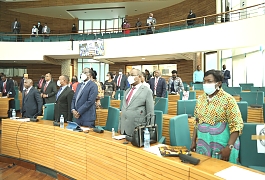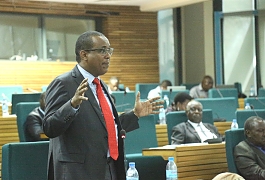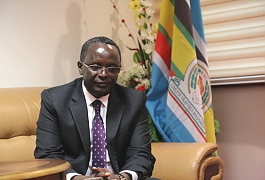EALA yesterday debated and adopted the Report of the Committee on Communications, Trade and Investments (CTI) on the Consultative Workshop on the East African Monetary Union (EAMU). While the Assembly maintained that the EAMU was a defining moment for the integration process, it reiterated the need for the region to move with haste to fully implement the Customs Union and the Common Market Protocols. Full implementation of the two Pillars, the Assembly ascertains, will pave way for entry of the single currency.
The Report presented by Hon Angela Kizigha, Chairperson of the CTI summed the findings of a Consultative Workshop held in September 9-11, 2013 in Kampala, Uganda. The Kampala meeting was organized to acquaint Members with the state of play of the progress of EAMU with regards to negotiations, opportunities and challenges involved.
The Report states that once in place, the EAMU would promote and sustain a zone of sound monetary policy and prudent fiscal policies to reinforce EAC’s monetary policies. The roadmap of the EAMU provides for its implementation over a ten year period, time within which, the single currency shall be realized. At the same time, the exchange rate policy shall have a convergence phase and the conversion of exchange rates shall be formulated and irrevocably fixed by the Council of Ministers.
Ideally, the pre-requisites for the EAMU pre-suppose the implementation of the Customs Union and the Common Market, integration of financial systems, harmonization and co-ordination of statistics and macro-economic policy. Other areas include the need to establish a mechanism for surveillance, compliance and enforcement, establishing an inflation ceiling of 8% and indicative criteria including fiscal deficit ceiling of 6%.
The proposed institutional framework under the EAMU envisages the establishment of the East African Monetary Institute (EAMI), East African Central Bank as well as a number of institutions dealing with statistics, finance, surveillance and compliance.
At debate time Hon James Ndahiro remarked that it was important for the Protocol to be comprehensive. “The Committee responsible for finalization of the Monetary Union Protocol needs to meet and liaise closely with the policy leaders including the Ministers and the Economists in order to ensure a common position on sticky matters”, he said.
The legislator remarked that EAC needed to protect itself from external shocks and to avoid situations that were replica of what happened in the EU especially Greece and Spain. “There are complex issues to deal with and this take time. It is therefore necessary that we harmonise pre-requisites in time. I am pleased the Protocol allows for three Partner States to progress at a given time and this shall not delay the Monetary Union,” he added.
Hon Frederic Ngenzebuhoro informed the House that the single currency was an important component of the Monetary Union capable of helping East Africans to realize their aspirations.
Hon Abdul Karim Harelimana was optimistic that the Monetary Union would be realized and suggested that at an appropriate time a unifying name for the currency be sought. He further reckoned that all efforts were needed to address the issue of currency convertibility.
Hon Dan Kidega said the Committee had held discussions with technical persons and experts who had enriched the process. He remarked that the Principle of Variable Geometry was increasingly becoming an important component of the integration process. Hon Kidega called for better management of statistics so as to give a true and factual picture of the Monetary Union and thus enable the complexities to be demystified. Hon Christophe Bazivamo called for the fast-tracking of the pillar while Hon Peter Mathuki urged the leaders and legislators of East Africa to ‘walk the talk’ when it comes to implementation of pillars of integration.
Hon Abdullah Mwinyi remarked that the pillars of the integration were inter-related and needed to be chronological (Customs Union, Common Market and the Monetary Union). He noted that the region lacked a single customs territory.
“I challenge the Council of Ministers to tell us why we are dragging on. What is the problem? Even the aim of free movement and integrating the Market is yet to be realized. I am afraid that if we do not fully implement the pillars, then the Monetary Union may only be theoretical” Hon Mwinyi said.
“Even as we look forward to the signing of the Monetary Union Protocol, it is evident that a number of gaps still exist in both the Customs Union and the Common Market Protocol. EALA needs its solid position on the matter,” he said.
Others in support of the Report were Hon Shy-Rose Bhanji, Hon Dora Byamukama, Hon Mike Sebalu, Hon Pierre Celestin Rwigema and Hon Susan Nakawuki.
The Chairperson of Council of Ministers, Hon Shem Bageine said the EAC was at an important time in the integration process. He noted that a number of challenges were notable including rise in work permit fees in some Partner States, lack of a Customs Authority due to inability to establish the Customs Territory and generally, the different pace at which Partner States are moving.
Hon Bageine said the phased mode of the Monetary Union Protocol would enable Partner States to eventually converge. “We are at different paces in development and we are not expected to catch up overnight”, the Minister said.
The Minister said the EAC would work closely with different agencies to see how to finance the Monetary Union. He reiterated that the ten year period was a guideline. “If all works well, we may have a single currency in a shorter period, he noted.
The Minister also answered priority questions from the Members.
DOWNLOAD: CTI REPORT ON THE CONSULTATIVE WORKSHOP ON EAST AFRICAN MONETARY UNION (EAMU)
-Ends-
_____________________________
For more information, contact:
Bobi Odiko,
Senior Public Relations Officer,
East African Legislative Assembly,
Cell: +255-787-870945, +254-733-718036.
Email: Bodiko@eachq.org



